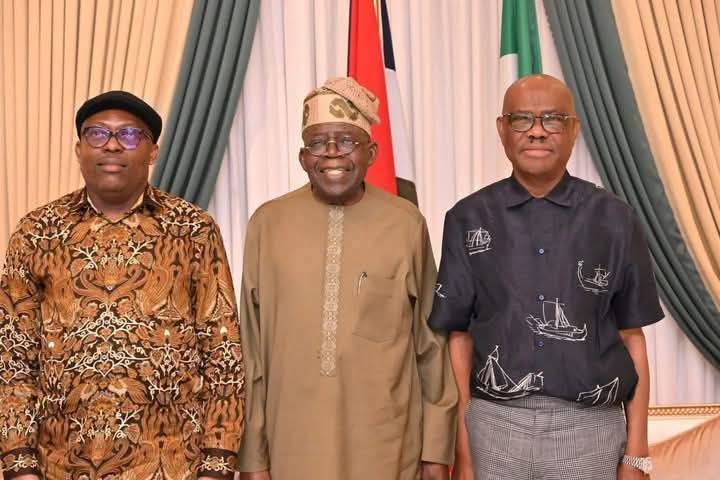Abuja, NIGERIA — President Bola Tinubu convened a reconciliation meeting on Thursday night at the Presidential Villa in Abuja, aimed at quelling the escalating political crisis in Rivers State.
The unprecedented meeting involved key political figures embroiled in the conflict, marking a crucial step toward restoring harmony and governance in the troubled region.
The meeting, which was held behind closed doors, saw the attendance of Governor Siminalayi Fubara, Federal Capital Territory Minister Nyesom Wike, Speaker Martins Amaewhule, and various members of the Rivers State Assembly. The atmosphere was reportedly tense, as participants sought to navigate the complex dynamics of power and authority in a state currently grappling with uncertainty.

The peace initiative comes in the wake of President Tinubu’s dramatic declaration of a state of emergency on March 18, a decision that suspended Governor Fubara, his deputy, and all members of the State House of Assembly. The president’s actions were prompted by escalating tensions and a breakdown of governance within Rivers State, reflecting a concerning pattern of discord that has plagued the region.
In the lead-up to the emergency declaration, Rivers State has experienced a series of political upheavals, with allegations of misconduct and infighting among elected officials. The situation has raised alarm across Nigeria, as citizens and political analysts alike observe the implications of such instability on democratic processes and the rule of law.
President Tinubu, in his opening remarks at the meeting, emphasized the importance of unity and cooperation among the state’s political leaders. He called for an immediate halt to hostilities and urged all parties to prioritize the welfare of the residents of Rivers State. According to sources close to the discussions, the president’s tone was firm yet conciliatory, reflecting his determination to mediate effectively and restore peace.
The involvement of Nyesom Wike, a prominent figure in Nigerian politics and formerly the governor of Rivers State, added a layer of complexity to the proceedings. Wike’s critical role as a mediator was viewed as crucial, considering his deep understanding of the local political landscape and his previous experiences in navigating similar crises.
Observers have noted that restoring goodwill among the key political stakeholders in Rivers State is imperative for achieving a sustainable solution to the ongoing conflict. While the meeting is a step in the right direction, it remains to be seen whether the parties can reach a viable consensus that addresses the crux of the political strife.
Moreover, the stakes in Rivers State are high, not only due to its strategic economic importance fueled by oil production but also because of its potential to influence political dynamics across Nigeria. Many fear that without a tangible resolution, the situation could spiral further out of control, leading to greater instability that would hinder developmental progress in the State.
As the discussions unfolded on Thursday night, political analysts expressed cautious optimism. The meeting is being closely watched, with many hoping that it will pave the way for dialogue and compromise among the state’s political leaders. Such an outcome could serve as a model for resolving conflicts in other regions and reinforce the principles of democracy in Nigeria.
In the wake of the peace talks, President Tinubu reiterated his administration’s commitment to peace and stability across all states, urging leaders to prioritize dialogue and collaboration over confrontation. As stakeholders prepare for the expected outcomes of this significant meeting, the future of Rivers State hangs in the balance, relying on the ability of its leaders to transcend political divisions for the greater good.